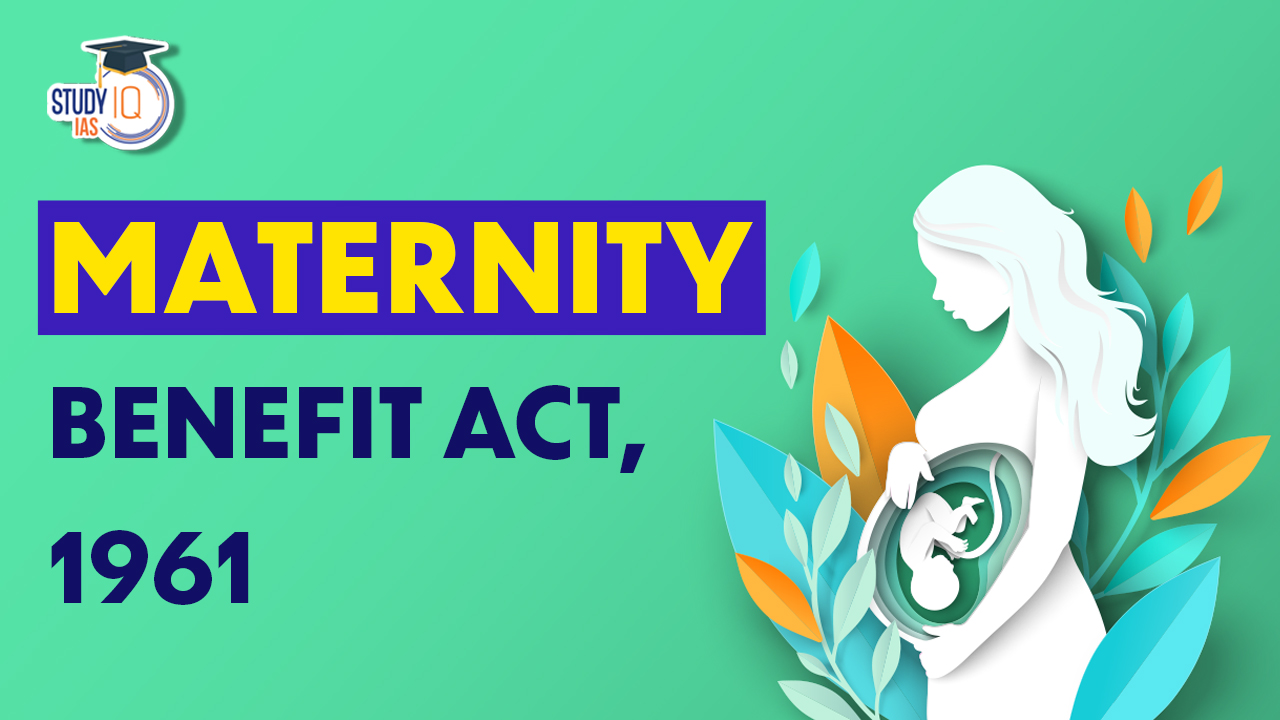Table of Contents
Maternity Benefit Act, 1961
The Maternity Benefit Act of 1961 is a piece of legislation that supports women’s employment during their pregnancies. It guarantees the female employee “maternity benefits,” which are the payment of their wages while they are away from work caring for a newborn. Any business with more than 10 employees must follow this rule. The 2017 Maternity Amendment Bill further altered this law.
The Act is a significant piece of legislation that safeguards motherhood’s honour. It also makes sure that working mothers can provide their kids the care they need. Maternity benefits assist women financially in addition to defending women’s rights.
Maternity Benefit Act, 1961 Applicability
Factory, mine, and plantation establishments are covered by the Maternity Benefit Act of 1961. Additionally, it applies to government facilities used for acrobatic horse performances. Any organisation that, in the previous 12 months, employed more than 10 people each day in any shop or establishment in the relevant state of India is also subject to the aforementioned Act. Additionally, certain plants and groups are covered by this Act. For the sake of the workers’ goodwill, it must be adhered to.
This Act must be followed by every organization, and the employees must receive a number of perks. As a result, the workers receive the greatest care possible and their proper health is preserved. Since employees are what make a business develop, ensuring their wellbeing is essential.
Maternity Benefit Act, 1961 Eligibility
Following is a description of the Maternity Benefit Act, 1961’s eligibility requirements. The employee (women) must have worked for the establishment for at least 80 days in the last year to be eligible to receive benefits under this Act.
Maternity Benefit Act, 1961 Provision
The Maternity Benefit Act of 1961’s provisions apply to all of India. The Act also covers women who miscarry in addition to public hospitals, nursing homes, schools, and other businesses. A woman is entitled to a maximum of six weeks of paid leave if her pregnancy ends in miscarriage or she has an abortion. If she delivers delivery earlier, the earnings will be paid 48 hours after the birth certificate is produced.
Women were granted 12 weeks of maternity leave under the terms of the Maternity Benefit Act of 1961. The Maternity Benefit (Amendment) Act of 2017 has risen the leave term from 12 to 26 weeks, nevertheless. The 26-week period of maternity leave can be divided up so that you can take up to 8 weeks of time off before your due date for delivery and the remaining time off after giving birth.
Up to two children may be granted the 26-week maximum maternity leave duration. The 12-week leave period applies to women who have more than two children. A woman is not obligated to work for six weeks after a miscarriage, according to the Act, unless the miscarriage was caused by a medical termination of the pregnancy. Additionally, moms who have used a surrogate or adopted a child under three months old are eligible for 12 weeks of leave.
Maternity Benefit Act, 1961 Benefits
A pregnant woman may work from home while receiving maternity benefits, according to the Act. However, both the employer and the employee must consent to the terms of employment. During her initial appointment, the employer is required to explain the maternity benefits to the expectant worker.
The employee must deliver the needed paperwork to the employer in order for the benefit to be paid throughout the maternity period. The states have been ordered by the Ministry of Labour to provide pregnant women with clarifications. Women must take advantage of the advantages of working from home since it allows them to spend time with their newborns and provide them with the care they need.
According to the Act, an employer is required to provide pregnant workers with the required notice before the due date of their kid. She must receive this notice from the employer within 48 hours. The worker shall be informed of the policy in this manner. The lady may apply for maternity benefits if she is ready to work from home.
During the first meeting, the employee must be told about the maternity benefits. The employer is required by law to provide the benefit even if the employee declines. No organization will accept an abrupt departure or leave of absence. The legislation was created with the employees in mind, therefore both the organization and they must utilize it to its fullest potential.
Maternity Benefit Act, 2017
The Maternity Benefit Act of 1961 is amended by the Act. It also offers maternity benefits while regulating the employment of women during the time of childbirth. It is applicable to businesses including factories, mines, plantations, and stores. Additionally, it modifies clauses relating to other amenities, as well as the length and applicability of maternity leave.
Maternity Benefit Act, 2017 Amendment
Duration of maternity leave
According to the Act, every woman will be eligible for a 26-week maternity benefit. According to the Act, this maternity benefit should not be used before eight weeks have passed after the due date. When a woman has two or more children, the maternity benefit remains at 12 weeks and cannot be used before six weeks have passed since the due date of the anticipated delivery.
Maternity leave for adoptive and commissioning mothers
The Act adds a clause granting a woman who lawfully adopts a child under three months of age, as well as a commissioning mother, 12 weeks of maternity leave. A biological mother who utilises her egg to make an embryo that is placed in another woman is known as a commissioning mother. The start date for the 12-week maternity benefit term will be the day the child is given to the adoptive or commissioning mother.
Option to work from home
A clause stating that an employer may allow a woman to work from home is introduced by the Act. This would be the case if the woman’s job required her to work from home. After the maternity leave period, the woman may use this option for a period of time that is mutually agreed upon by the company and the employee.
Creche facilities
The Act adds a clause requiring childcare services to be available close by for every business with 50 or more employees. The woman is permitted four visits to the childcare facility per day. This will also cover her downtime.
Maternity Benefit Act, 1961 UPSC
Women can now feel secure and empowered thanks to the Maternity Benefit Act of 1961. Protecting motherhood and ensuring a secure financial future for both are its key objectives. It gives someone financial assistance while preserving the dignity of a mother and her child. The Act is a wonderful illustration of how the law may grant moms rights. A woman’s future is now significantly more secure thanks to the Maternity Benefit Act of 1961’s effective implementation. The Act provides the employees with a specific advantage that ultimately enables them to experience a stress-free pregnancy.


 Right To Information Act, Objective, Fea...
Right To Information Act, Objective, Fea...
 Indian Councils Act 1861, History, Provi...
Indian Councils Act 1861, History, Provi...
 NCERT Books for UPSC Preparation, Check ...
NCERT Books for UPSC Preparation, Check ...





















